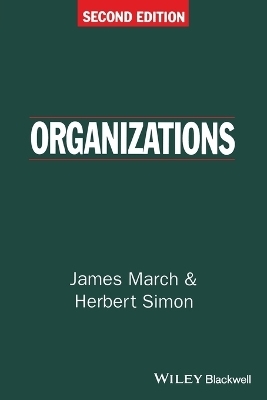
Organizations
Wiley-Blackwell (Verlag)
978-0-631-18631-1 (ISBN)
Everything you ever wanted to know about growing grapes
March and Simon's Organizations has become a classic in the field of organizational management for its broad scope and depth of information. Written by two of the most prominent experts in the field, this book offers invaluable insight on all aspects of organizational culture through deep discussion of organization theory. The definitive reference for topics including bounded rationality, satisficing, inducement/contribution balances, attention focus, uncertainty absorption and more, this seminal text offers authoritative insight with a practical grounding in the field.
James G. March is Professor of Organizational Theory, Emeritus, Graduate School of Business; Professor of International Economics, Emeritus; Professor of Political Science and Professor of Sociology, School of Humanities and Sciences; Professor of Education, School of Education - Stanford University.
List of Figures vii Acknowledgments viii
Introduction to the Second Edition 1
1 Organizational Behavior 20
1.1 The Significance of Organizations as Social Institutions 21
1.2 The Literature of Organization Theory 23
1.3 Organization of This Book 25
1.4 Some Types of Propositions 26
1.5 Some Psychological Postulates 28
2 "Classical" Organization Theory 31
2.1 Taylor's Scientific Management 31
2.2 Theories of Departmentalization 40
2.3 Operational and Empirical Problems of Classical Administrative Science 49
2.4 Conclusion 52
3 Motivational Constraints: Intraorganizational Decisions 53
3.1 Influence Processes 54
3.2 Theories of Bureaucracy 55
3.3 Satisfaction and Productivity 66
3.4 Motivation to Produce 71
3.5 Conclusion 101
4 Motivational Constraints: The Decision to Participate 103
4.1 The Theory of Organizational Equilibrium 103
4.2 The Participants 108
4.3 Employee Participation: The Participation Criterion 110
4.4 Employee Participation: The General Model 112
4.5 Factors Affecting the Perceived Desirability of Movement from the Organization 113
4.6 Factors Affecting the Perceived Ease of Movement from the Organization 119
4.7 Extension to Other Participants 125
4.8 Opportunism and Organizational Survival 128
4.9 Conclusion 130
5 Conflict in Organizations 132
5.1 Individual Conflict 133
5.2 Organizational Conflict: Individual Conflict Within an Organization 137
5.3 Organizational Conflict: Intergroup Conflict Within an Organization 140
5.4 Organizational Reaction to Conflict 149
5.5 Interorganizational Conflict 152
5.6 Conclusion 155
6 Cognitive Limits on Rationality 157
6.1 The Concept of Rationality 158
6.2 Performance Programs in Organizations 163
6.3 Perception and Identifications 172
6.4 The Division of Work 179
6.5 Communication 182
6.6 Organization Structure and the Boundaries of Rationality 190
7 Planning and Innovation in Organizations 193
7.1 The Concept of Initiation 193
7.2 The Process of Innovation 197
7.3 The Occasions of Innovation 203
7.4 The Elaboration of Programs 207
7.5 Organization Level and Innovation 215
7.6 The Planning Process 221
7.7 Conclusion 232
Postscript 234
Bibliography 236
Numerical Index to Variables 276
Index 281
| Erscheint lt. Verlag | 26.4.1993 |
|---|---|
| Verlagsort | Hoboken |
| Sprache | englisch |
| Maße | 154 x 229 mm |
| Gewicht | 454 g |
| Themenwelt | Geisteswissenschaften ► Psychologie ► Arbeits- und Organisationspsychologie |
| Wirtschaft ► Betriebswirtschaft / Management ► Planung / Organisation | |
| ISBN-10 | 0-631-18631-X / 063118631X |
| ISBN-13 | 978-0-631-18631-1 / 9780631186311 |
| Zustand | Neuware |
| Haben Sie eine Frage zum Produkt? |
aus dem Bereich


